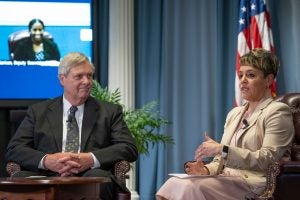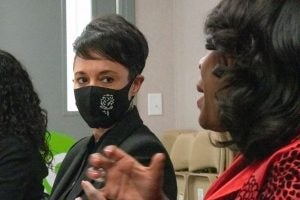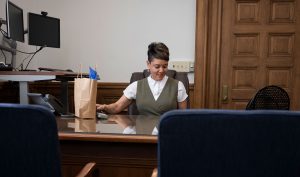Deputy Secretary of Agriculture Dr. Jewel Bronaugh is cultivating trust, accountability, and diversity in the USDA through the Equity Commission
The U.S. Department of Agriculture, like many federal executive departments, follows the flow of history within the United States. That flow of history is like a river.
Sometimes, a river dries up. It’s just bone dry.
Even when we believe the whole thing is bone dry and the river bed is in full view, below the surface of the river bed, deep down, is a watershed holding on to waters from the past.
Like a bone dry river, the country may not look as it did 50, 60, 70 years ago; its non-synonymous to the height of the Civil Rights Movement or even decades before when our country struggled to find all people deserving of equal human and societal rights.
However, the fact that we can’t blatantly see racism or discrimination based on someone’s identity doesn’t negate that it doesn’t happen; that there isn’t a watershed below, or covert racism and discrimination, right beneath our feet.
In no way am I sharing that a watershed itself isn’t beneficiary. The watershed serves as a mere analogy of covert racism stored beneath the dried up river of racism. Today, this covert racism and discrimination commonly fissures and spills out of the watershed and into our daily lives from outdated, and covertly discriminatory, policies and practices.
» Related reading: Emergency Relief for Farmers of Color Act’s funds diverted due to institutional pressures
Dr. Jewel Bronaugh, Deputy Secretary of Agriculture, and the entire USDA Equity Commission acknowledge these understandings and the lived experiences of people who have faced discrimination within the department and outside the department.
“We acknowledge, historically, that there is an inherent lack of trust in the USDA,” Bronaugh shared with me over phone. “There are folks who have had negative experiences that have impacted their families and livelihoods and don’t trust us. … We take full responsibility for this.”

Her humility and ownership knows no bounds. Throughout the entirety of her interview with me for AGDAILY, I heard her loyalty to her duty, to the people of the USDA, and of those she serves alongside. Even while acknowledging the pitfalls of the past, she is proud of the federal executive department and excited to lead the change they are headed toward.
“If we don’t start to do something that people can see, then trust will never happen in the USDA,” Bronaugh said. Resolute, thoughtful, and true.
On Feb. 28, 2022, the USDA Equity Commission debuted its committee discussions, led by Bronaugh and fellow co-chair Arturo S. Rodriguez. Rodriguez, who is the United Farm Workers Organizational president emeritus and hails from California, was selected as the co-chair of the USDA Equity Commission and the communications and public relations expert during committee work. Together, their collective influence and leadership will create openness and provide perspective to the committee.
Throughout their time on the USDA Equity Commission, Bronaugh shared that they hope to discuss and address the following challenges she sees within the federal executive department:
- Moving toward racial equity
- Strengthening accountability within the USDA
- Reducing barriers in access of the USDA’s information, programs, resources, and services
- Inclusivity internally within the USDA
Of course, Bronaugh understands that these items are destined for amending and additions, as she shared that the department will be guided by the committee’s recommendations and informed by their guidance before moving forward.
During the initial meeting of the USDA Equity Commission, the committee also began looking at copious amounts of research and data of what has been done or has not been done to address equity issues and discrimination issues within the department.
“A lot of the history shows that we have recognized that there were issues over the years, but it just wasn’t addressed,” Bronaugh said.

Even though some of the data, research, and anecdotes collected and reviewed by the committee on the inequities within the USDA were frustrating to see gone unchanged, Bronaugh knows that she has the right people at the table to tackle what this data is sharing about the USDA’s equity challenges.
“I am very excited about this committee,” she said. “What was wonderful is that we have 28 members, 15 members on the Equity Commission, and 15 on the Ag subcommittee. Two on the Ag subcommittee serve on the Equity Commission. They are all change agents, thinkers, and they are busy people. Not one of the times did any of them leave early. They were all engaged, thoughtful on what needed to be changed, and very thoughtful on how we engage the voices of communities.”
As Bronaugh spoke about the committee, I couldn’t help but feel satisfied inside. The USDA Equity Commission embodies a diverse group of skilled and experienced individuals to lead the federal executive agency toward accountability and trust building for each citizen the USDA impacts.
“We had to make sure that we had inclusive membership. That is the key to our commission,” Bronaugh said.
As a strong, decisive leader and co-chair of the USDA Equity Commission, Bronaugh enlisted folks who represented underserved communities, those who work in change managers, civil rights advocates, and organizational DEIA (diversity, equity, inclusion and accessibility) experts to serve on the committee and subcommittee. Some of these leaders include Derrick Johnson, president and CEO of the NAACP, Dr. Hazell Reed, executive director of the National Black Growers Council, and Poppy Sias-Hernandez, chief equity and inclusion officer at State of Michigan and executive director of the Office of Global Michigan. Yvonne Lee, former commissioner for the U.S. Commission on Civil Rights, and lawyer Sarah Vogel — selected at the discretion of the deputy secretary — were also chosen for their background in policy drafting, making, and navigating.
There are so many more folks involved, from farmers and ranchers, to state secretaries of agriculture, CEOs and co-founders. Bronaugh also wanted the committee to not just reflect different mindsets and social perspectives, but also various identities such as minorities, women, people with different abilities, different languages, folks in poverty, LGBTQI communities, and our veterans.
The Equity Commission membership, when viewing the occupations of those involved and their purpose on the committee, definitely is holistic to what is needed to ensure the success of the commission’s discussions and work.
“We wanted to include people who would have likely been discriminated against [by USDA’s policies and practices] and those who reflect the communities we service,” said Bronaugh, sharing that their perspectives bring an anecdotal and thoughtful lens to the committee’s work.

Next steps for the committee is to continue to meet, brainstorm, and work toward recommendations for the USDA to implement.
“There are things we can get started with immediately,” Bronaugh noted. “If we think that there are decisions or programs we can make immediately, we will consider those … but we need to make sure it makes sense and ask the important questions before moving forward.”
As we wait for more updates about the committees’ meetings and actions that will follow, those who work in DEIA spaces in agriculture or those new to the space will feel more relief knowing that there are people at the helm who care deeply about closing the equity gaps in United States agriculture. And, that there are better days for each U.S. farmer and consumer when we know that everyone who is served by the USDA is given an equitable opportunity to participate in production agriculture.
“I can’t overstate how important this is — it’s important to me because it’s important to the communities we serve [at the USDA],” Bronaugh said. “We want to do everything in our power to bolster this in the USDA and beyond.”
Bre Holbert is a past National FFA President and studies agriculture science and education at California State-Chico. “Two ears to listen is better than one mouth to speak. Two ears allow us to affirm more people, rather than letting our mouth loose to damage people’s story by speaking on behalf of others.”




